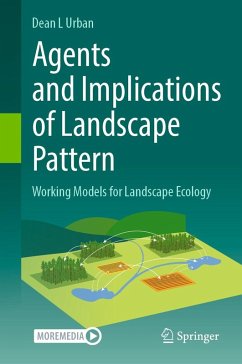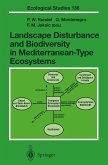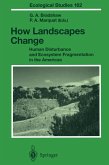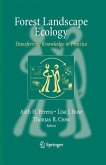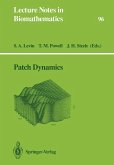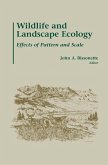Agents and Implications of Landscape Pattern (eBook, PDF)
Working Models for Landscape Ecology


Alle Infos zum eBook verschenken

Agents and Implications of Landscape Pattern (eBook, PDF)
Working Models for Landscape Ecology
- Format: PDF
- Merkliste
- Auf die Merkliste
- Bewerten Bewerten
- Teilen
- Produkt teilen
- Produkterinnerung
- Produkterinnerung

Hier können Sie sich einloggen

Bitte loggen Sie sich zunächst in Ihr Kundenkonto ein oder registrieren Sie sich bei bücher.de, um das eBook-Abo tolino select nutzen zu können.
This is an ecology textbook focused on key principles that underpin research and management at the landscape scale. It covers (1) agents of pattern (the physical template, biotic processes, and disturbance regimes); (2) scale and pattern (why scale matters, how to 'scale' with data, and inferences using landscape pattern metrics); and (3) implications of pattern (for metapopulations, communities and biodiversity, and ecosystem processes). The last two chapters address emerging issues: urban landscapes, and adapting to climate change.
This book stems from two graduate-level courses in…mehr
- Geräte: PC
- ohne Kopierschutz
- eBook Hilfe
- Größe: 35.31MB
![Landscape Disturbance and Biodiversity in Mediterranean-Type Ecosystems (eBook, PDF) Landscape Disturbance and Biodiversity in Mediterranean-Type Ecosystems (eBook, PDF)]() Landscape Disturbance and Biodiversity in Mediterranean-Type Ecosystems (eBook, PDF)217,95 €
Landscape Disturbance and Biodiversity in Mediterranean-Type Ecosystems (eBook, PDF)217,95 €![How Landscapes Change (eBook, PDF) How Landscapes Change (eBook, PDF)]() How Landscapes Change (eBook, PDF)161,95 €
How Landscapes Change (eBook, PDF)161,95 €![Forest Landscape Ecology (eBook, PDF) Forest Landscape Ecology (eBook, PDF)]() Forest Landscape Ecology (eBook, PDF)113,95 €
Forest Landscape Ecology (eBook, PDF)113,95 €![Patch Dynamics (eBook, PDF) Patch Dynamics (eBook, PDF)]() Patch Dynamics (eBook, PDF)40,95 €
Patch Dynamics (eBook, PDF)40,95 €![Wildlife and Landscape Ecology (eBook, PDF) Wildlife and Landscape Ecology (eBook, PDF)]() Wildlife and Landscape Ecology (eBook, PDF)113,95 €
Wildlife and Landscape Ecology (eBook, PDF)113,95 €![Landscape Ecological Analysis (eBook, PDF) Landscape Ecological Analysis (eBook, PDF)]() Landscape Ecological Analysis (eBook, PDF)113,95 €
Landscape Ecological Analysis (eBook, PDF)113,95 €![The Demilitarized Zone (DMZ) of Korea (eBook, PDF) The Demilitarized Zone (DMZ) of Korea (eBook, PDF)]() Kwi-Gon KimThe Demilitarized Zone (DMZ) of Korea (eBook, PDF)113,95 €
Kwi-Gon KimThe Demilitarized Zone (DMZ) of Korea (eBook, PDF)113,95 €-
-
- -44%11
This book stems from two graduate-level courses in Landscape Ecology taught at the Nicholas School of the Environment at Duke University. The subject has evolved over time, from a concepts-based overview of what landscape ecology is, to a more applied practicum on how one does landscape ecology. As landscape ecology has matured as a discipline, its perspectives on spatial heterogeneity and scale have begun topermeate into a wide range of other fields including conservation biology, ecosystem management, and ecological restoration. Thus, this textbook will bring students from diverse backgrounds to a common level of understanding and will prepare them with the practical knowledge for a career in conservation and ecosystem management.
Dieser Download kann aus rechtlichen Gründen nur mit Rechnungsadresse in A, B, BG, CY, CZ, D, DK, EW, E, FIN, F, GR, HR, H, IRL, I, LT, L, LR, M, NL, PL, P, R, S, SLO, SK ausgeliefert werden.
- Produktdetails
- Verlag: Springer International Publishing
- Seitenzahl: 327
- Erscheinungstermin: 11. Oktober 2023
- Englisch
- ISBN-13: 9783031402548
- Artikelnr.: 69138871
- Verlag: Springer International Publishing
- Seitenzahl: 327
- Erscheinungstermin: 11. Oktober 2023
- Englisch
- ISBN-13: 9783031402548
- Artikelnr.: 69138871
.- 5.5.1. Approaches to Inferences on Pattern .- 5.5.2. Illustrations .- 5.5.3. Inferences on Pattern: Area versus Configuration.- 5.5.4 Inferences on Pattern: the State-of-the-Art.- 5.6. Summary and Conclusions. References .- Implications of Pattern: Metapopulations .- 6.1. Introduction.- 6.2. Metapopulations in Theory .- 6.2.1. The Levins Model.- 6.2.2. The Spreading-of-Risk Model .- 6.2.3. The Source-Sink Model.- 6.2.4. The Incidence Function Model .- 6.2.5. Commonalities among Metapopulation Models.- 6.2.6. Characteristic Behaviors of (Model) Metapopulations .- 6.3. Metapopulations in Practice .- 6.3.1. Are there Real Metapopulations in Nature? .- 6.3.2. Macroscopic Approaches to Metapopulations .- 6.4. Network Models of Metapopulations .- 6.4.1. Graphs and Metapopulations .- 6.5. Metapopulations and Connectivity Conservation .- 6.5.1. Structural and Functional Connectivity .- 6.5.2. Metapopulations and Landscape Genetics .- 6.6. A Model Template for Applications .- 6.7. Summary and Conclusions .- References .- Supplement 6.1. Details on the Metapopulation Models .- S6.1.1. The Levins Model .- S6.1.2. The Spreading-of-Risk Model .- S6.2.3. The Source-Sink Model .- S6.2.4. The Incidence Function Model .- S6.2.5. Notes on the Individual-based Simulators Metapop1 .- Communities and Patterns of Biodiversity .- 7.1. Introduction .- 7.2. Island Biogeography and Landscapes.- 7.2.1. Area and Isolation Effects .- 7.2.2. Island Biogeographic Theory and the SLOSS Debate .- 7.2.3. A Diversity of Diversities .- 7.3. Perspectives on Metacommunities .- 7.3.1. A General Framing .- 7.3.2. Inferences and Limits to Inference .- 7.4. Approaches and Lines of Evidence .- 7.4.1. The Incidence Matrix and Community Assembly .- 7.4.2. Metacommunity Models: Variations on a Theme .- 7.4.3. Species Distribution Models .- 7.4.4. Multvariate Approaches to Partitioning Beta-diversity .- 7.4.5. Lines of Evidence and Complementary Analyses .- 7.5. Illustration: Sierran Forests .- 7.5.1. The Perspective of Ordination and Gradient Analysis .- 7.5.2. Partitioning Beta-diversity .- 7.6. Managing Metacommunities .- 7.7. Summary and Conclusions .- References.- Supplement 7.1. Disciplinary Approaches (Details) .- S7.1.1. Incidence Matrices and Community Assembly.- S7.1.2. Metacommunity Models: Variations .- S7.1.3. Species Distribution Models .- S7.1.4. Ordination Techniques .- IImplications of Pattern for Ecosystems .- 8.1. Introduction .- 8.2. Spatial Heterogeneity and Ecosystems .- 8.2.1. Spatial Heterogeneity in the Physical Template .- 8.2.2. Lateral Fluxes on Landscapes .- 8.2.3. Landform and Landscape Processes .- 8.2.4. Ecosystem Processes and Positive Feedbacks .- 8.2.5. Ecosystems are both Fast and Slow .- 8.3. Ecosystems and Landscape Legacies .- 8.4. Patch Juxtaposition and Edge Effects .- 8.4.1. Edge Effects, Revisited .- 8.4.2. Edges and Ecosystem Processes: Forest Carbon .- 8.5. Ecosystems and Meta-ecosystems .- 8.5.1. Couplings between Systems .- 8.5.2. Meta-ecosystems, Revisited .- 8.5.3. Implications of Meta-ecosystem Structure .- 8.6. Summary and Conclusions .- References .- Urban Landscapes .- 9.1. Introduction .- 9.2. Social-Environmental Systems .- 9.2.1. Approaches to Studying Cities .- 9.3. Agents and Implications of Pattern .- 9.3.1. Agents of Pattern .- 9.3.2. Scale and Pattern .- 9.3.3. Implications of Pattern .- 9.3.4. Revisiting the Agents-and-Implications Framing .- 9.4. Urban Landscapes as Laboratories .- 9.4.1. The Urban Stream Syndrome .- 9.4.2. Cities as Mesocosms for Global Change .- 9.5. Summary and Conclusions .- References.- 10. Climate Change: Adapting for Resilience .- 10.1 Introduction .- 10.2. Framing Adaptation .- 10.2.1. Components of Climate Change .- 10.2.2. The Perspective of Risk Management .- 10.2.3. Options for Response and Adaptation .- 10.2.4. Resilience Planning: the Tasks at Hand .- 10.3. Approaches to Adaptation Planning .- 10.3.1. Levels of Activity and Currency of Assessments .- 10.3.2. Elements of Adaptation .- 10.3.3. A Template for Applications .- 10.4. Illustrations of Approaches .- 10.4.1. NatureServe's HCCVI.- 10.4.2. Species Range Shifts implied by Climate Change .- 10.4.3. TNC's Resilient Landscapes Initiative .- 10.4.4. The ACT Framework .- 10.4.5. Complementarity of Approaches .- 10.5. CollateralBenefits and Leverage.- 10.5.1. Adaptation Planning and Conservation Practice .- 10.5.2. Collateral Benefits.- 10.5.3. Adaptation and Mitigation .- 10.6. Summary and Conclusions .- References .- Index..
.- 5.5.1. Approaches to Inferences on Pattern .- 5.5.2. Illustrations .- 5.5.3. Inferences on Pattern: Area versus Configuration.- 5.5.4 Inferences on Pattern: the State-of-the-Art.- 5.6. Summary and Conclusions. References .- Implications of Pattern: Metapopulations .- 6.1. Introduction.- 6.2. Metapopulations in Theory .- 6.2.1. The Levins Model.- 6.2.2. The Spreading-of-Risk Model .- 6.2.3. The Source-Sink Model.- 6.2.4. The Incidence Function Model .- 6.2.5. Commonalities among Metapopulation Models.- 6.2.6. Characteristic Behaviors of (Model) Metapopulations .- 6.3. Metapopulations in Practice .- 6.3.1. Are there Real Metapopulations in Nature? .- 6.3.2. Macroscopic Approaches to Metapopulations .- 6.4. Network Models of Metapopulations .- 6.4.1. Graphs and Metapopulations .- 6.5. Metapopulations and Connectivity Conservation .- 6.5.1. Structural and Functional Connectivity .- 6.5.2. Metapopulations and Landscape Genetics .- 6.6. A Model Template for Applications .- 6.7. Summary and Conclusions .- References .- Supplement 6.1. Details on the Metapopulation Models .- S6.1.1. The Levins Model .- S6.1.2. The Spreading-of-Risk Model .- S6.2.3. The Source-Sink Model .- S6.2.4. The Incidence Function Model .- S6.2.5. Notes on the Individual-based Simulators Metapop1 .- Communities and Patterns of Biodiversity .- 7.1. Introduction .- 7.2. Island Biogeography and Landscapes.- 7.2.1. Area and Isolation Effects .- 7.2.2. Island Biogeographic Theory and the SLOSS Debate .- 7.2.3. A Diversity of Diversities .- 7.3. Perspectives on Metacommunities .- 7.3.1. A General Framing .- 7.3.2. Inferences and Limits to Inference .- 7.4. Approaches and Lines of Evidence .- 7.4.1. The Incidence Matrix and Community Assembly .- 7.4.2. Metacommunity Models: Variations on a Theme .- 7.4.3. Species Distribution Models .- 7.4.4. Multvariate Approaches to Partitioning Beta-diversity .- 7.4.5. Lines of Evidence and Complementary Analyses .- 7.5. Illustration: Sierran Forests .- 7.5.1. The Perspective of Ordination and Gradient Analysis .- 7.5.2. Partitioning Beta-diversity .- 7.6. Managing Metacommunities .- 7.7. Summary and Conclusions .- References.- Supplement 7.1. Disciplinary Approaches (Details) .- S7.1.1. Incidence Matrices and Community Assembly.- S7.1.2. Metacommunity Models: Variations .- S7.1.3. Species Distribution Models .- S7.1.4. Ordination Techniques .- IImplications of Pattern for Ecosystems .- 8.1. Introduction .- 8.2. Spatial Heterogeneity and Ecosystems .- 8.2.1. Spatial Heterogeneity in the Physical Template .- 8.2.2. Lateral Fluxes on Landscapes .- 8.2.3. Landform and Landscape Processes .- 8.2.4. Ecosystem Processes and Positive Feedbacks .- 8.2.5. Ecosystems are both Fast and Slow .- 8.3. Ecosystems and Landscape Legacies .- 8.4. Patch Juxtaposition and Edge Effects .- 8.4.1. Edge Effects, Revisited .- 8.4.2. Edges and Ecosystem Processes: Forest Carbon .- 8.5. Ecosystems and Meta-ecosystems .- 8.5.1. Couplings between Systems .- 8.5.2. Meta-ecosystems, Revisited .- 8.5.3. Implications of Meta-ecosystem Structure .- 8.6. Summary and Conclusions .- References .- Urban Landscapes .- 9.1. Introduction .- 9.2. Social-Environmental Systems .- 9.2.1. Approaches to Studying Cities .- 9.3. Agents and Implications of Pattern .- 9.3.1. Agents of Pattern .- 9.3.2. Scale and Pattern .- 9.3.3. Implications of Pattern .- 9.3.4. Revisiting the Agents-and-Implications Framing .- 9.4. Urban Landscapes as Laboratories .- 9.4.1. The Urban Stream Syndrome .- 9.4.2. Cities as Mesocosms for Global Change .- 9.5. Summary and Conclusions .- References.- 10. Climate Change: Adapting for Resilience .- 10.1 Introduction .- 10.2. Framing Adaptation .- 10.2.1. Components of Climate Change .- 10.2.2. The Perspective of Risk Management .- 10.2.3. Options for Response and Adaptation .- 10.2.4. Resilience Planning: the Tasks at Hand .- 10.3. Approaches to Adaptation Planning .- 10.3.1. Levels of Activity and Currency of Assessments .- 10.3.2. Elements of Adaptation .- 10.3.3. A Template for Applications .- 10.4. Illustrations of Approaches .- 10.4.1. NatureServe's HCCVI.- 10.4.2. Species Range Shifts implied by Climate Change .- 10.4.3. TNC's Resilient Landscapes Initiative .- 10.4.4. The ACT Framework .- 10.4.5. Complementarity of Approaches .- 10.5. CollateralBenefits and Leverage.- 10.5.1. Adaptation Planning and Conservation Practice .- 10.5.2. Collateral Benefits.- 10.5.3. Adaptation and Mitigation .- 10.6. Summary and Conclusions .- References .- Index..
